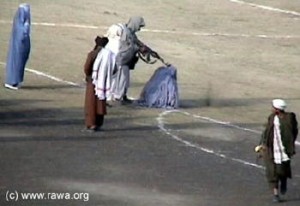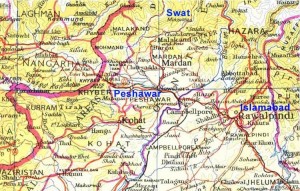The Small Wars Journal Blog links to a report by embedded journalist Nir Rosen, who spent some time with hard core Taliban, and wrote How We Lost the War We Won: A journey into Taliban-controlled Afghanistan for Rolling Stone. It’s an interesting report, but for regular readers of The Captain’s Journal, it’s not obvious that we learn much new (Sorry here, no bragging, and no embedded report from this end, but we’ve been covering OEF intensely for almost a year, ridiculing inept Army intelligence when they fed General Rodriguez the lunacy that the Taliban wouldn’t launch a spring offensive, telling our readers how important the Torkham Crossing and Chaman were, warning of affects of the TTP and Baitullah Mehsud, warning that roads and construction were irrelevant if IEDs tore them up, warning that British work on dams would be to no avail if dam workers were killed by the Taliban or if the electrical grid was taken out, warning that NATO was hopelessly deadlocked in red tape with many European troops sitting at FOBs with candy-ass rules of engagement, and so on, and so forth, and on and on, again and again and again. Been there, done that.).
So, go and read Rosen’s piece if you wish, it’s linked above. But regular readers of The Captain’s Journal will see our warnings in real life, real time. You’ve read it for a year. Now you can read a summary of our work in 45 minutes. Not bragging – just saying. We’re more interested in the take on this whole affair by Dave at The Small Wars Journal. Says Dave:
Just call me old fashioned – I have serious misgivings respecting and tolerating journalists who embed with an enemy (the Taliban in this instance) responsible for what some call the strictest interpretation and implementation of Sharia law “ever seen in the Muslim World.” The crimes against humanity that were a direct result of their rule in Afghanistan and continue in their desire to regain that rule cannot be forgiven or glossed over in hopes of some temporary respite from increased violence in Afghanistan and Pakistan.
Yea, yea, okay – some people’s terrorists are other people’s freedom fighters – yada, yada – save it for the think tank- or university-circle sponsored seminars, studies and white papers. There is still black and white in today’s complex environment and our efforts in South Asia should most certainly fall within that category.
If there was ever a grouping of individuals and supporters that deserved complete annihilation (yea – I said the A word) – the Taliban and their support structure would and should be up front and center. It will take quite some time (that is why it is called The Long War) and there will most certainly be peaks and valleys along the way – but we must – and will – win this one and we will write the last chapter of the history book reserved for the victors.
Cheers, loud applause from the whole stadium – and the fans keep erupting in spontaneous dancing and celebrations and more applause and cheers. Now, just to set the mood going forward with this article, see the picture below.

The woman being killed (h/t LT Nixon Rants) probably forgot to pull her burqa completely closed and some of her face was showing. Not enough, says you? Want more? How about this.
In Meerwala, Pakistan, an 11-year-old boy walked unchaperoned with a girl. This was a violation of Islam. A tribal council was called.
The boy’s father pleaded that since he was too young to have sex, the girl was safe and no harm was done. The council disagreed. But instead of punishing the boy, it decided to punish his whole family by punishing his 18-year-old sister.
In order to shame the family, the council sentenced the teenage daughter to be gang raped. Four members of the council took turns forcing themselves upon her in a mud hut, as hundreds of villagers laughed and cheered.
“I touched their feet,” said the girl to an Associated Press reporter. “I wept. I cried. I said I taught the holy Qur’an to children in the village, therefore don’t punish me for a crime which was not committed by me. But they tore my clothes and raped me one by one.”
There you have it. The hard core Taliban and people who support them. Now. We can’t kill everyone, but every time The Captain’s Journal has weighed in negatively at the Small Wars Council (handle – Danny) on negotiating with these bastards, much consternation ensues, with Danny being labeled as someone who doesn’t understand counterinsurgency.
The Captain’s Journal (Danny) has lost much sleep over COIN. We’re very close to one particular SAW gunner who stopped counting his kills (literally – stopped counting, according to independent confirmations) and asked for prayer every time we talked. We’ve killed many, many enemy (the Wikipedia entry on Operation Alljah is low in number of enemy dead). As for the rest, “we’re paying them not to shoot at us,” said the SAW gunner to Danny.
Danny nodded approvingly that night, “Good, good,” said Danny. “Good. This is the way it’s supposed to be. Kill the irreconcilables without mercy, make peace with the rest, and sooner or later they will learn to be citizens again. Pay them until then. Good, good. This is the way it should be done.” And so Danny had very good sleep that night, and made sure that there was a concerned citizens category and that we weighed in with approval. Danny has thought quite a bit about counterinsurgency.
But the Anbaris were relatively secular compared to the Taliban, and had no love for the extreme vision of al Qaeda. It’s estimated that there are some 8000 – 20,000 Taliban fighters in the South and East, and these fighters are probably irreconcilable. Peel away a few, okay. Fine. Make your silly attempts to reconcile and negotiate, and you’ll get a few come to our side. But as for the hard core fighters (the majority), they must be killed. Their vision has as its world view a radical version of Islam that is either globalist in its import, or is amenable to that vision (and thus malleable for al Qaeda fighters).
Dave says he’s old fashioned. Fine with us. We are too. As for Nir Rosen, Danny doesn’t need the embedded report. We can figure it out on our own. We may as well have had someone embed with the Schutzstaffel while the Jews were being exterminated. Just as there is nothing romantic about putting Jews in ovens to die, there is nothing good, wholesome, romantic or righteous about Taliban ideology. Nir Rosen had better watch his six, or better yet, embed with U.S. troops.






